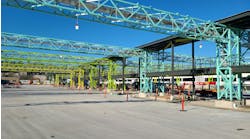L.A. Metro approves $180-million implementation plan to improve bus service on North San Fernando Valley Transit Corridor
The Los Angeles County Metropolitan Transportation Authority (L.A. Metro) Board of Directors approved the $180-million implementation plan for the North San Fernando Valley Transit Corridor to improve the speed, reliability and passenger experience for bus services on major thoroughfares throughout the San Fernando Valley. The implementation plan is expected to begin in fall 2023 and be completed by winter 2025. The board’s approval also gives the project environmental review clearance through an exemption from the California Environmental Quality Act under Senate Bill 288.
"This plan will make it easier for Valley residents to travel with greater reliability, ease and comfort on Metro buses, and it will provide better east-west transit service with improved access to jobs, education and essential services," said Glendale City Council Member and Metro Board Chair Ara J. Najarian. "By increasing the frequency of service and adding new bus shelters and zero-emission buses, this is a game changer for mobility and sustainability in the Valley."
The new bus rapid transit network changes will improve connectivity between Valley transit services. As part of the plan, peak period bus priority lanes will be implemented on Roscoe Boulevard, weekday service will be improved to a 10-minute frequency on both Roscoe Boulevard and Nordhoff Street, and new bus shelters will be installed at nearly 400 Valley locations. Five key passenger transfer locations will see enhanced bus stop facilities with larger shelters, more seating, better lighting and real-time information.
The primary corridors where improvements will be made include:
- Roscoe Boulevard
- Nordhoff Street
- Lankershim Boulevard
- Reseda Boulevard
- Sherman Way
- Vanowen Street
- Victory Boulevard
The project also provides improved connectivity with stops in Panorama City, Northridge and California State University, Northridge.
The plan also includes transit signal priority to reduce travel times for seven bus lines:
- 152
- 162
- 164
- 165
- 166
- 224
- 240
In addition, 75 new battery electric buses will be purchased to fully electrify four Valley bus lines. All buses will be equipped with TAP validators at their rear doors to allow all-door boarding.
"Bus rapid transit improvements will play a critical role in improving mobility for our region," said L.A. County Supervisor and Metro Board Member Kathryn Barger. "Our goal is to provide Angelenos with more frequent and reliable connections to Valley job centers, housing and major destinations like California State University, Northridge."
"With these improvements, Valley residents will benefit from dramatically improved transportation infrastructure" said L.A. City Council President and Metro Board Member Paul Krekorian. "By improving key bus stops, adding hundreds of new bus shelters, providing for all-door boarding and other amenities, we will be providing our Valley bus riders a quicker and more comfortable trip."
The project also provides many improvements for more transit-dependent customers who live in the Valley’s equity-focused communities. Reliable, on-time, frequent and faster transit options will improve customer access to work, school, healthcare, daycare and many other necessary destinations.
The San Fernando Valley’s nearly 1.9 million residents on average spend hours commuting to work – in large part because of the traffic and congestion in the area," said Metro CEO Stephanie Wiggins. "Projects like these will enhance the quality of life for the Valley’s residents – many of them working families."
The project adds to a growing list of projects now underway in the San Fernando Valley that will bring more transit service to the region’s 1.9 million residents. Metro will break ground on advanced utility work for the East San Fernando Valley Light Rail Transit Project in early December. To be built in two phases, this project will add 14 new stations between the G Line (Orange) Van Nuys Station and the Sylmar/San Fernando Metrolink Station.
The funding for the North San Fernando Valley Transit Corridor Project is provided by the Measure M transportation sales tax measure approved by voters in 2016. It funds projects that ease traffic, expand public transportation and repair local streets and sidewalks.

